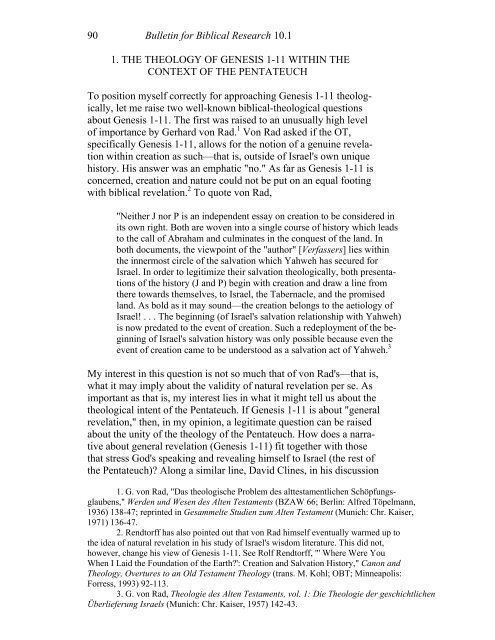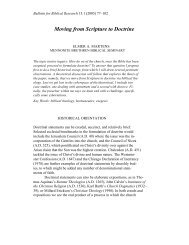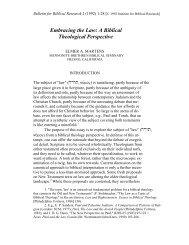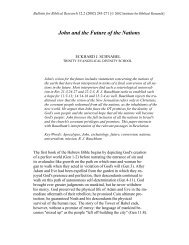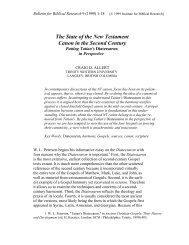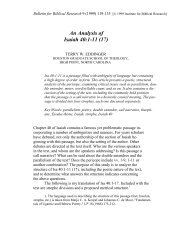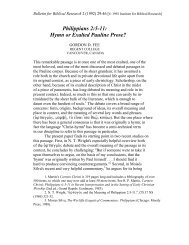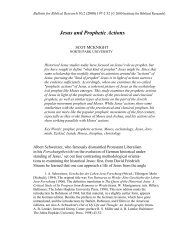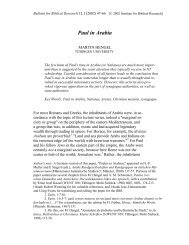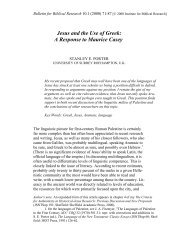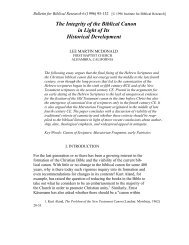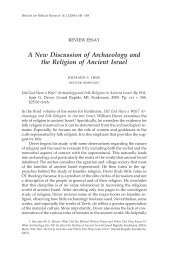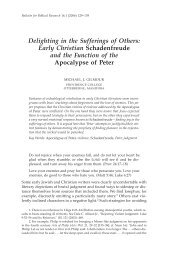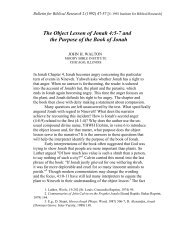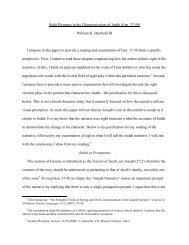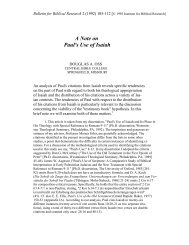Creation, Genesis 1-11, and the Canon - Institute for Biblical Research
Creation, Genesis 1-11, and the Canon - Institute for Biblical Research
Creation, Genesis 1-11, and the Canon - Institute for Biblical Research
Create successful ePaper yourself
Turn your PDF publications into a flip-book with our unique Google optimized e-Paper software.
90 Bulletin <strong>for</strong> <strong>Biblical</strong> <strong>Research</strong> 10.1<br />
1. THE THEOLOGY OF GENESIS 1-<strong>11</strong> WITHIN THE<br />
CONTEXT OF THE PENTATEUCH<br />
To position myself correctly <strong>for</strong> approaching <strong>Genesis</strong> 1-<strong>11</strong> <strong>the</strong>ologically,<br />
let me raise two well-known biblical-<strong>the</strong>ological questions<br />
about <strong>Genesis</strong> 1-<strong>11</strong>. The first was raised to an unusually high level<br />
of importance by Gerhard von Rad. 1 Von Rad asked if <strong>the</strong> OT,<br />
specifically <strong>Genesis</strong> 1-<strong>11</strong>, allows <strong>for</strong> <strong>the</strong> notion of a genuine revelation<br />
within creation as such—that is, outside of Israel's own unique<br />
history. His answer was an emphatic "no." As far as <strong>Genesis</strong> 1-<strong>11</strong> is<br />
concerned, creation <strong>and</strong> nature could not be put on an equal footing<br />
with biblical revelation. 2 To quote von Rad,<br />
"Nei<strong>the</strong>r J nor P is an independent essay on creation to be considered in<br />
its own right. Both are woven into a single course of history which leads<br />
to <strong>the</strong> call of Abraham <strong>and</strong> culminates in <strong>the</strong> conquest of <strong>the</strong> l<strong>and</strong>. In<br />
both documents, <strong>the</strong> viewpoint of <strong>the</strong> "author" [Verfassers] lies within<br />
<strong>the</strong> innermost circle of <strong>the</strong> salvation which Yahweh has secured <strong>for</strong><br />
Israel. In order to legitimize <strong>the</strong>ir salvation <strong>the</strong>ologically, both presentations<br />
of <strong>the</strong> history (J <strong>and</strong> P) begin with creation <strong>and</strong> draw a line from<br />
<strong>the</strong>re towards <strong>the</strong>mselves, to Israel, <strong>the</strong> Tabernacle, <strong>and</strong> <strong>the</strong> promised<br />
l<strong>and</strong>. As bold as it may sound—<strong>the</strong> creation belongs to <strong>the</strong> aetiology of<br />
Israel! . . . The beginning (of Israel's salvation relationship with Yahweh)<br />
is now predated to <strong>the</strong> event of creation. Such a redeployment of <strong>the</strong> beginning<br />
of Israel's salvation history was only possible because even <strong>the</strong><br />
event of creation came to be understood as a salvation act of Yahweh. 3<br />
My interest in this question is not so much that of von Rad's—that is,<br />
what it may imply about <strong>the</strong> validity of natural revelation per se. As<br />
important as that is, my interest lies in what it might tell us about <strong>the</strong><br />
<strong>the</strong>ological intent of <strong>the</strong> Pentateuch. If <strong>Genesis</strong> 1-<strong>11</strong> is about "general<br />
revelation," <strong>the</strong>n, in my opinion, a legitimate question can be raised<br />
about <strong>the</strong> unity of <strong>the</strong> <strong>the</strong>ology of <strong>the</strong> Pentateuch. How does a narrative<br />
about general revelation (<strong>Genesis</strong> 1-<strong>11</strong>) fit toge<strong>the</strong>r with those<br />
that stress God's speaking <strong>and</strong> revealing himself to Israel (<strong>the</strong> rest of<br />
<strong>the</strong> Pentateuch)? Along a similar line, David Clines, in his discussion<br />
1. G. von Rad, "Das <strong>the</strong>ologische Problem des alttestamentlichen Schöpfungsglaubens,"<br />
Werden und Wesen des Alten Testaments (BZAW 66; Berlin: Alfred Töpelmann,<br />
1936) 138-47; reprinted in Gesammelte Studien zum Alten Testament (Munich: Chr. Kaiser,<br />
1971) 136-47.<br />
2. Rendtorff has also pointed out that von Rad himself eventually warmed up to<br />
<strong>the</strong> idea of natural revelation in his study of Israel's wisdom literature. This did not,<br />
however, change his view of <strong>Genesis</strong> 1-<strong>11</strong>. See Rolf Rendtorff, "' Where Were You<br />
When I Laid <strong>the</strong> Foundation of <strong>the</strong> Earth?': <strong>Creation</strong> <strong>and</strong> Salvation History," <strong>Canon</strong> <strong>and</strong><br />
Theology, Overtures to an Old Testament Theology (trans. M. Kohl; OBT; Minneapolis:<br />
Forress, 1993) 92-<strong>11</strong>3.<br />
3. G. von Rad, Theologie des Alten Testaments, vol. 1: Die Theologie der geschichtlichen<br />
Überlieferung Israels (Munich: Chr. Kaiser, 1957) 142-43.


